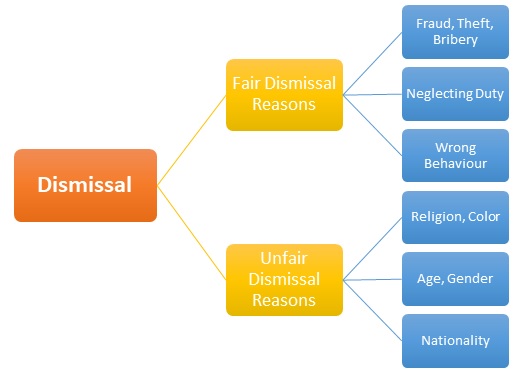- Business Concepts ›
- Human Resources (HR) ›
- Dismissal
Dismissal
This article explains definition, importance & types of Dismissal from HRM perspective.
Dismissal Definition
Dismissal is the act of removing or terminating the job or employment of an employee. Dismissal is when a person working in a company is dismissed from his or her duties. Dismissal is sometimes also termed as firing or sacking of the employee.
Importance of Dismissal
Job termination or dismissal is an important part of human resources management. People are employed with a company and have to abide by company policies, responsibilities and work culture. Sometimes people neglect the rules and regulations in an organization and have to be removed or dismissed. It is to sack or fire employees who cause a risk to the business or set a bad example for the other employees. Dismissal of employees are done if the are caught doing a fraud, neglect duty, leak confidential information behave inappropriately etc. Dismissal of wrong or bad employees is essential to maintain a good, safe, trustworthy and positive environment at workplace.

Types of Dismissal
Depending on the reason of termination, there are broadly two types:
1. Fair dismissal – It is when a company is fair or justified in removing an employee from the job. If the employee is proven on charges of theft, habitual negligence of duty, disorderly behaviour, bribery, incapability, financial regularities or subordination, then the job of the employee can be terminated. Since the company has valid reasons to remove the employee, it is referred as fair dismissal. Companies usually give orders with a notice period or can be an immediate termination as well.
2. Unfair dismissal – It reasons includes maternity reasons, taking part in union activites, whistle-blowing, discrimination on grounds of age, gender, race, religion, nationality etc. It can also be due to economic reasons when an employee had to be laid-off. It is also called as unjustifiable dismissal. Since the reasons are unclear, it becomes unfair for the employee and hence referred as unfair dismissal.
Apart from these, there can also be constructive dismissal.
Dismissal of employees is mainly to remove any employees who spoil the positive work culture or who have done any wrong doings.
Hence, this concludes the definition of Dismissal along with its overview.
This article has been researched & authored by the Business Concepts Team which comprises of MBA students, management professionals, and industry experts. It has been reviewed & published by the MBA Skool Team. The content on MBA Skool has been created for educational & academic purpose only.
Browse the definition and meaning of more similar terms. The Management Dictionary covers over 1800 business concepts from 5 categories.
Continue Reading:
What is MBA Skool?About Us
MBA Skool is a Knowledge Resource for Management Students, Aspirants & Professionals.
Business Courses
Quizzes & Skills
Quizzes test your expertise in business and Skill tests evaluate your management traits
Related Content
All Business Sections
Write for Us